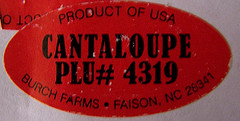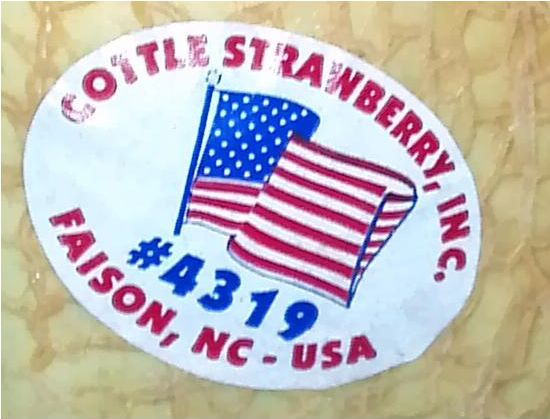News & Events
FDA NEWS RELEASE
Update: August 13, 2012: Burch Equipment LLC (Burch Farms) of Faison, N.C., is expanding its recall to include all of this growing season's cantaloupes and honeydew melons that may remain on the market. Cantaloupes involved in this recall expansion can be identified as described in the update below from August 10, 2012. The honeydew melons involved in this recall expansion do not bear any identifying stickers but were packed in shipping cases labeled melons.
Consumers who think they may have purchased these honeydew melons should contact the store where they made their purchases and ask for information about whether their melons originated from Burch Farms. The cantaloupes and honeydew melons involved in this expanded recall were sold to distributors in the states of Florida, Georgia, Illinois, Kentucky, Massachusetts, Maryland, Maine, Michigan, North Carolina, New Hampshire, New Jersey, New York, Ohio, Pennsylvania, South Carolina, Virginia, Vermont and West Virginia, who may have further distributed them to other states.
This recall expansion is based on the FDA's finding of Listeria monocytogenes (L. mono) on a honeydew melon grown and packed by Burch Farms. The recall expansion is also a result of the agency’s finding of L. mono in the environment of the firm’s packing facility.
Consumers are reminded that, for listeria, the length of time between consuming a product and becoming ill can be one to three weeks, but may be in the range of three to 70 days. To date no known illnesses have been reported that are linked to consumption of the honeydew melon or cantaloupes included in this recall. The FDA will provide further updates as they become available.
Listeriosis, caused by L. mono, is typically characterized by fever and muscle aches, sometimes preceded by diarrhea and other gastrointestinal problems. The disease primarily affects older adults, pregnant women, newborns, and adults with weakened immune systems. However, rarely, persons without these risk factors can also be affected.

Update: Aug. 10, 2012: Upon further in-depth investigation, the FDA has determined and confirmed with Burch Equipment LLC that the firm did not, in fact, ship cantaloupe packed into sweet potato cartons.
UPDATE: August 3, 2012: Burch Equipment LLC (Burch Farms) of Faison, N.C., is expanding its recall to include 13,888 cases of whole cantaloupes (nine cantaloupes per case) and 581 bins (110 cantaloupes per bin) of whole cantaloupes, due to potential Listeria monocytogenes (L. mono) contamination. The cantaloupes involved in this expanded recall were shipped July 15-27 to retail stores in Florida, Georgia, Illinois, Maryland, North Carolina, New Jersey, New York, Pennsylvania, South Carolina, and Virginia.


For Immediate Release: July 30, 2012
Media Inquiries: Pat El-Hinnawy, 301-796-4763, patricia.el-hinnawy@fda.hhs.gov
Consumer Inquiries: 800-INFO-FDA
FDA warns consumers not to eat cantaloupes from Burch Equipment LLC of North Carolina
Listeria monocytogenes contamination found in samples shipped to New York, Maine
The U.S. Food and Drug Administration is warning consumers not to eat whole cantaloupes from Burch Equipment LLC, of Faison, N.C., because of possible contamination with Listeria monocytogenes (L. mono).
- The company had shipped 580 cases of whole cantaloupes on July 15, which were then distributed to retail stores in New York and Maine.
- Consumers who may have cantaloupes with a red label displaying the words Burch Farms and referencing PLU #4319 should discard them as a precautionary measure.
- Cantaloupes from the North Carolina firm tested positive for L. mono following sampling carried out in New York, as part of sampling conducted through the USDA Microbiological Data Program.
- On July 28, 2012, Burch Equipment LLC issued a voluntary recall of the 580 cases of whole cantaloupes.
- No known illnesses have been reported that are linked to consumption of these cantaloupes.
What are the symptoms of Listeria mono illness?
Listeriosis, caused by L. mono, is typically characterized by fever and muscle aches, sometimes preceded by diarrhea and other gastrointestinal problems. The disease primarily affects older adults, pregnant women, newborns, and adults with weakened immune systems. However, rarely, persons without these risk factors can also be affected.
Consumers should also be aware that the incubation period for listeriosis can be 1 to 3 weeks, but may be in the range of 3 to 70 days.
What do consumers need to do?
Consumers who may have cantaloupes should check the fruit’s tag for a red label reading Burch Farms and referencing PLU #4319, and destroy any product with this identification.
Consumers who think they may have become ill from eating possibly contaminated cantaloupes should consult their health care providers.
Where were the cantaloupes distributed?
The cantaloupes were distributed to retail supermarkets in the states of New York and Maine and it is likely those distributors sent to additional states. Grocery store owners should be aware that the FDA also learned that the cantaloupes were packed into sweet potato cartons.
What is being done about the problem?
FDA is working jointly with state officials in North Carolina, New York and Maine to investigate the cause and scope of the L. mono contamination and to ensure that all cantaloupes with the potential for L. mono contamination are removed from the market. Additionally, a recall has been initiated by Burch Equipment LLC.
Hannaford Supermarkets, based in Scarborough, Maine, is advising consumers who purchased Burch Farms cantaloupes from their supermarkets, to not consume these cantaloupes as they have the potential of being contaminated with L. mono.
Who should be contacted?
Consumers with questions about fresh fruit safety may call the FDA at 1-888-SAFEFOOD or email consumer@fda.gov.
The information in this press release reflects the FDA’s best efforts to communicate what it has learned from state and local public health agencies involved in the investigation. The agency will provide updates as more information becomes available.
For more information:
- Burch Equipment LLC, North Carolina, is Voluntarily Recalling 580 Cases of Whole Athena Cantaloupes Due to Possible Health Risk
- North Carolina Farm Recalls Athena Cantaloupes
The FDA, an agency within the U.S. Department of Health and Human Services, protects the public health by assuring the safety, effectiveness, and security of human and veterinary drugs, vaccines and other biological products for human use, and medical devices. The agency also is responsible for the safety and security of our nation's food supply, cosmetics, dietary supplements, products that give off electronic radiation, and for regulating tobacco products.
# # #
Read our Blog: FDA Voice
Visit the FDA on Facebook ![]() , Flickr
, Flickr ![]() , YouTube
, YouTube ![]() , and Twitter
, and Twitter ![]()
RSS Feed for FDA News Releases







